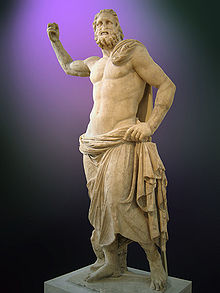The ancient Greeks were much indulged in dark theological thinking. They loved more a myth and performed a cult. They had no a special religious ideologues. Greece religion inherited much from the primitive religions: animism and demonism. The ancient Greeks worshiped forces in the shape of animals, trees and various objects. When they gave the gods the human form, the previous fetishes, totems, adored animals and worshiped items have become companions of the gods (Athens dedicated to the falcon, Artemis deer, horse to Poseidon, Aphrodite – dolphin …).
Also many plants have become attributes of the gods. Sacred plants were: the Temple of Zeus at Dodona, Temple of Apollo’s at Delphi, Athena’s olive tree in Athens.
Herodotus said that Homer and Hesiod created the Greek theogony and each deity was given a nickname, role and character. Hesiod Theogony from the 8th century BC was the oldest and most comprehensive literary source of information on Greek religion and myth. In the Greek myths, in addition to gods appeared also heroes, idealized people of semi-god origin who performed extraordinary acts. Many myths Greeks had received from other nations and developed them in his own way.
Greek cities and their other cultural centers have had their religious holidays. In Athens were annually celebrated Panathenaea, and every 4 years of the Great Panathenaea. Every year in Athens celebrated the festival of Thesmophoria (a holiday in honor of Demeter) and Dionysius. Spartans and others celebrated Carneia, holiday Apollo Carneian. Some local holidays became tribal, and the others Hellenic. Zeus feast at Olympia, feast of Apollo at Delphi and the island of Delos, Poseidon the Corinthian Isthmos and Heracles in Nemea were all pan-Hellenic holidays. On the occasion of these holidays Greeks from all sides came to the place of celebration and held various competitions.
CLASSICAL GODS :
Zeus – the god of light and sky, the father of men and gods. Everywhere was worshiped, especially at Dodona and Olympia.
Hera – Zeus’ wife and queen of the gods. She was the goddess of women, marriage and family. Hera was well worshipped by the Ancient Greeks, and the oldest and most important temples of the region were built in honour of her. Her sacred animals were the cow, lion and peacock.
Athens – daughter of Zeus, goddess of wisdom and power, she was the most worshiped in Thessaly, Arcadia and Attica.



Demeter – the sister of Zeus, the goddess of agriculture, vegetation and crop growth. She was also associated with the seasons. Her happiness and sorrow (Persephone) depended on the change of seasons.
Apollo – A son of Zeus, Apollo was the Greek god of music, arts, light and medicine. Primarily the god of light, the divine sun (in the hands had a bow and arrows that made the darkness). His main sanctuary was at Delphi. Although associated with health and healing, together with his twin sister Artemis, he could bring disease and plague to humans.
Artemis – the daughter of Zeus, Apollo’s sister, the goddess of animals, wildlife and hunting. Her symbol was a hind. In Sparta worshiped Artemis Orthia, protector of justice and morality. The most worshiped was in Ephesus, where the Artemision was built, one of the 7 Wonders of the ancient world.
Poseidon – brother of Zeus, the god of earth and sea. He lived in the depths of the sea. His weapon was a trident which was said to be so powerful it could shake the earth and shatter any object!
Hermes – A son of Zeus, Hermes was the messenger of the gods. He was also responsible for guiding the dead to the underworld. Hermes was said to be the fastest of the gods and wore winged sandals and a winged hat. He was also known for his intelligence and wit, and would help Zeus with his important decisions.
Ares – the son of Zeus and Hera, the god of war and anger. He was worshiped by the Thracians.
Aphrodite – the goddess of beauty and love.
Hephaestus – the son of Zeus and Hera, god of fire and blacksmith crafts.
Dionysus – the god of vegetation, especially vines.
Hades – brother of Zeus, lord of the underworld and ruler of the dead. Hades presented the realm of the dead. The Greeks believed that the deceased in the underworld water was led by Hermes, that in Hades Charon transported souls across the River Styx At the gates of Hades standed three-headed dog Cerberus. Had the land of darkness, silence and oblivion.
